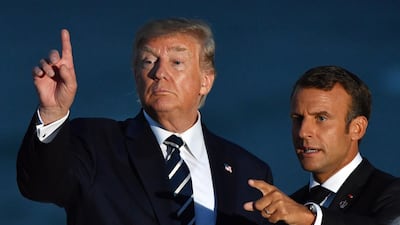French President Emmanuel Macron has acknowledged his attempt to bring Iran and the US together is fragile, but he says there is still a “possible path” to talks after decades of conflict.
After inviting the Iranian Foreign Minister Javad Zarif as a surprise guest to the G7 summit in France at the weekend, Mr Macron used an address on Tuesday to explain his manoeuvre.
He said he wanted to help create “possible conditions for a useful meeting” between the Iranian leadership and US President Donald Trump.
On Monday at the G7 he expressed hope that Mr Trump and Iranian President Hassan Rouhani could meet within weeks.
Mr Trump said there was a “really good chance” that could happen even if the Iranian leader seemed less optimistic, probably facing a backlash at home.
Mr Macron said later that it was France’s responsibility to play the “role of a balancing power” and that his efforts allowed hope for an easing of tension.
Mr Trump has shown that he can increase tension with rivals such as North Korea before quickly changing his approach and moving to talks.
Sanam Vakil, senior research fellow at Chatham House, warned that “ironing out the issues” between Tehran and Washington would be no easy task.
"It's important to champion Macron’s Iran diplomacy," Ms Vakil said on Twitter. "He is doing what is needed to deescalate tensions."
Mr Rouhani on Tuesday spoke in a cautious tone, saying the Trump administration must first lift sanctions imposed on Tehran, which have hit the Iranian economy hard and led the regime to take an increasingly aggressive stance.
He said that Washington “holds the key” to what happens next but a mere photo opportunity would not suffice.
On Monday Mr Rouhani had seemed more optimistic, saying he “would not miss” a chance to bolster Iran’s development and rectify its economic issues that are putting it under pressure.
He has also been forced to stand up for Mr Zarif after a backlash from hard-liners in Iran.
Iranian state media has been scathing of Mr Macron and insisted that the regime's missile programme and regional presence would not be part of any negotiations.
Le Monde's G7 editorial said it was unclear what Mr Macron had gained in the "diplomatic frenzy" but he had defied expectations ahead of the summit.
“The G7, which at worst was looking catastrophic and at its best useless, turned into a meeting where leaders were able to dialogue smoothly,” it said.
“Above all, Donald Trump has been made aware of a European agenda dominated by the climate, Iran and international taxation.”
Quoting his hero, French post-war leader Gen Charles de Gaulle, a smiling Mr Macron told France 2 television on Monday evening after the summit ended: "Diplomacy is about trying to hold broken glass together.
"We tried and we succeeded in making significant progress at this G7 on the subject of the Iranian crisis."


